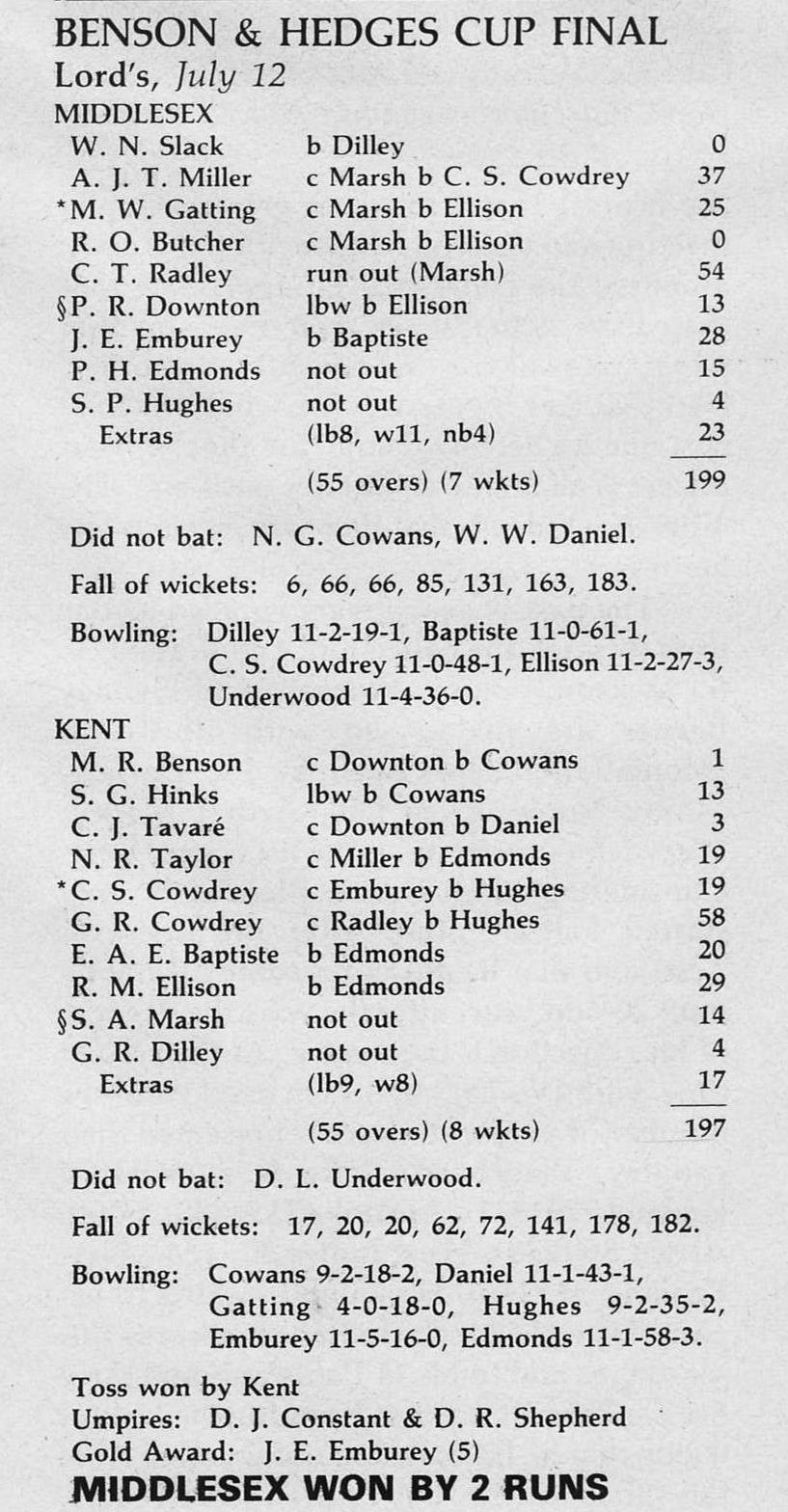That’s amazing how winning in the rain. Middlesex squeezed home by two runs to win the Benson & Hedges Cup 1986 for the second time, with a thrilling finish making up for a quiet afternoon’s play. It was the tightest finish of all the 15 finals, with Middlesex’s four-run win over Essex in 1983 providing the previous-closest result.
This win, as in 1983, was completed in near-darkness, with the added problem of heavy rain. Chris Cowdrey put Middlesex in, counting on a forecast that predicted brighter weather later in the day. This never materialized, the whole match being played in poor light, and this and Kent’s tardy over rate (four short of the stipulated rate, leaving them liable to a £400 fine) sentenced his team to a gloomy final few overs.
Kent made a useful start, with Dilley in particular taking the eye. Slack played on before he had scored, and in the seventh over, Graham Dilley whistled a no-ball through Gatting, and a legitimate delivery through Miller. Cowdrey brought himself on for the 11th over and saw Gatting take two fours from it, the first just eluding brother Graham at point.

Miller was looking solid, and he too hit Cowdrey for two fours in an over, the second bringing up Middlesex’s 50. By now Ellison was causing problems, and with the score 66, he removed Gatting and Butcher with successive deliveries, both caught behind by the impressive Marsh. This brought in Radley, in his seventh Lord’s final, and soon he was putting his anti-Underwood plan into action: stepping outside the stump and advancing down the pitch, looking to drive straight or through the covers.
Radley lost Miller just before lunch, which saw Middlesex score 85 for 4, but soon after the interval, he took three fours from an Underwood over, which provoked a bowling change. Dilley returned, completing his 11 overs for only 19, but Radley continued, reaching his 50 in the 48th over, and seeing the 150 up in Baptiste’s next over, which cost 10 runs. Underwood, playing in a record 10th Lord’s final, returned to bowl to Emburey, and in his eagerness to steal the strike, Radley backed up too far and, sent back, was run out by a gentle underarm throw from Marsh.
John Emburey stayed for a useful 28, and at the end of their 55 overs, Middlesex had scored an unspectacular 199 for 7. Kent started cautiously against the speed of Daniel, operating from his short run, and Cowans. Mike Getting in the first slip put down a low chance offered by Hinks off Daniel bowling. But just as it seemed that the openers had seen off the fast pair, three quick wickets fell, Benson and Patrick Eagar Hinks going to Cowans, and Tavaré, playing a nondescript shot, caught behind off Daniel.
At 20 for 3, Taylor and Chris Cowdrey dug in to repair the damage and posted the 50 in the 23rd over. Emburey came on for the next over and, with a maiden, began a mean spell of bowling that was to yield only 16 runs. S.P. Hughes was his first partner, and with the score 62, Chris Cowdrey tried to glide the seamer through the slips, only to see John Emburey dive wide to his right to grasp a remarkable one-handed catch.
Kent hung on grimly until tea, taken at 71 for 4 after 35 overs. N.R. Taylor went soon after the interval, lofting Phil Edmonds to Miller, who took a well-judged catch running in from long-on, which left Kent needing 128 from 18 overs. Graham Cowdrey started to accelerate, just clearing Slack with a six towards the grandstand, off Edmonds, which saw Kent into three figures. By now the light was terrible, but Kent declined the umpires’ offer to go off, much to the crowd’s delight.
Chris Cowdrey and Baptiste hit out, Chris Cowdrey managing another six one-handed, this time from Edmonds, who was bowling (for reasons his biographer would no doubt describe as ‘singular’ in a 2nd XI sweater and a watch). In the gloom, Downton twice missed stumping Baptiste, but Phil Edmonds had his revenge after the second miss, bowling the Antiguan next ball. R.M. Ellison now batted well, lofting a Hughes no-ball for a straight six before receiving what one trusts was an accidental high full-toss from Daniel.
Chris Cowdrey completed a sterling 50 before popping up a Hughes delivery to Radley, who somehow managed to spot the ball in the darkness. Kent then needed 19 from two overs, and five came from the 54th, which Mike Gatting bravely entrusted to Edmonds. Courage paid off when Ellison was bowled for 29. So, to the last over, with 14 needed, Hughes bowled, S.A. Marsh batting, and rain bucketed down in the near-darkness. Somehow Marsh sighted a full-toss well enough to pull it high into the grandstand for six, and six more were needed from three balls.
Tragically for Kent, Marsh missed the next ball and could only scramble a single from the fifth, leaving Graham Dilley to score five from the last ball to win. He could manage only two. Adjudicator David Gower, understandably reluctant about stepping onto the pavilion balcony in the deluge, eventually chose John Emburey as the Gold Award winner, for his sensible batting, miserly bowling, and, crucially, fine fielding. The Middlesex supporters went home wet and happy. Kent’s were left to mutter moistly about what might have been.

SOURCE: WISDEN SEPTEMBER 1986